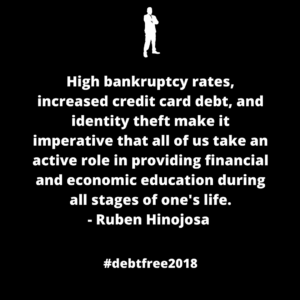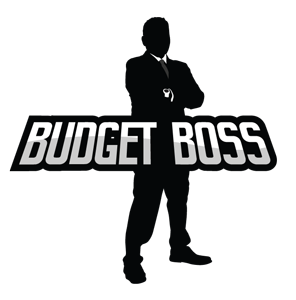Wednesday, January 31, 2018
Bankruptcy: Is it the best option?
I have been down the road of having to pay back an overwhelming amount of money. It was a scary time for me. During times like that, you think about your options. Should I run away? Should I work under the table the rest of my life to avoid creditors? Should I declare bankruptcy? All of these options are not good, but some are worse than others. I chose option D: Work my butt off to pay everyone back. I crunched the numbers and saw it was possible to get out of debt without fast-tracking. For some, the situation is far worse. If you cannot see any possible way of paying back what you owe, bankruptcy might be the best option. Of course, there are positives and negatives to any situation. In this post, I will discuss both the positives and the negatives to filing for bankruptcy. The key is to make an informed decision, and of course, always seek out the guidance of a trusted expert in bankruptcy.
All your debts will be erased…..almost all of them
If you are in a very tight position when it comes to debt, bankruptcy might be the best option. I will stress that I am not a bankruptcy trustee. I am just speaking off personal experience, so always contact a licensed bankruptcy trustee when discussing this topic. Let’s say you owe $75,000 in various debts. It could be partially credit cards, lines of credit and maybe even a little personal loan as well. If you only make $25,000 per year, to pay that amount back would be almost impossible. In this sort of situation, bankruptcy might be the best option. If you were to file for bankruptcy you would have those debts erased, but be very careful because not all debts get erased with bankruptcy.
Debts the bankruptcy covers:
Credit card debt including retail store cards
Unsecured lines of credit
Personal loans not secured by any asset
Income tax, HST and property taxes
Unpaid utility bills, cable and phone bills, insurance or membership payments
Medical bills
Payday loans
Debts that bankruptcy does not cover:
A student loan if it has been less than 7 years since your ceased being a student;
Alimony and child support;
Fines and penalties imposed by the court
Debts due to fraud.
Bankruptcy only covers unsecured debts meaning debts that aren’t backed by anything. It does not cover secured debts like your mortgage and car loan. Your student loan must be seven years old for it to be considered in a bankruptcy. Therefore, having a trusted bankruptcy trustee is important because they will guide you through exactly what is covered and what is not.
8 Myths of Bankruptcy – CBC News
You will lose all of your stuff….kind of
If you file for bankruptcy and you own a lot of things that have value, you will lose most of them. This can include high-value possession like automobiles, jewelry (if they know about it), artwork, expensive equipment and so on. You can keep a modest number of items, mainly because they have no resale value. This includes your clothing, furniture, tools of the trade and even a car with very little equity in it. Make no mistake, your creditors will try to get everything from you that they can, but the notion that you will be on the street begging for a sandwich is untrue. Much of this thought process comes from the creditors themselves who wish to get their money back and lose that opportunity if you go bankrupt. Creditors are also usually not allowed to touch RRSP’s, RRIF’s or locked-in pensions either. Some exceptions apply, so get all the information you can.
What Is A Trustee In Bankruptcy? – Bankruptcy Canada

You will never be able to get credit again
This is not true. You will be able to borrow again. Bankruptcy notations stay on your file for 6 years after your bankruptcy has been discharged. Side note: it could take several months and even a couple years for your bankruptcy to discharge. Once those 6 years are up, you will no longer have the bankruptcy on your credit file. During those 6 years, you can take steps to repair the damage done and even borrow again. Using a secured credit card, one you put up your own cash for is a great way to get started. I used one while I was paying off my debts as a traditional credit card was out of the realm for me. Once my debts were paid off I qualified immediately for a normal VISA card. You can also get a car loan or even a home during those 6 years, provided you have shown progress in your habits and meet the minimum income standards. There are many lenders who specialize in people with less than perfect credit.
10 Money Resolutions That Will Make Your 2018 Better Than 2017 – Budget Boss
Bankruptcy is not a big deal
Wrong! Bankruptcy is always seen as a last resort. It affects your life greatly but again, it is sometimes the lesser of many evils. It is not a decision to be taken lightly unless of course, you are the President of the United States. During the time it takes your bankruptcy to discharge, you will have to hand over complete control of your finances to the bankruptcy trustee. You will have to report all income and hand over all credit cards. You will even have to attend credit counseling meetings as well. If you do not accomplish certain tasks while the bankruptcy is being discharged, you can be fined or even jailed. Once the bankruptcy is discharged the long battle of rebuilding begins. You will have to endure years of hard work and patience to get back to a solid ground. I stress that bankruptcy should be seen as a last resort and always have a trusted bankruptcy trustee help you with the decision. I would even allow a trusted family member or friend in on the process, so they can help you make the best decision.
I use my own situation as a barometer for this kind of decision. One of the main reasons I decided to not declare bankruptcy is that the challenge of paying back my debts was an important challenge for me to take on. I knew there would be many more tough times ahead in life be it work, family, and of course health. The pros and cons list for this type of decision is a big deal, so weigh all your options. Remember that the choice you make is final and you will have to live with the consequences. Also, remember that bankruptcy trustee’s do take a fee for what they do, so proceed with caution.
Thanks for tuning in today as Loan Week continues at Budget Boss. Join us tomorrow as we jump into car loans and leases. If you have debt issues and would like to discuss them, I would be happy to hear and help. Email me at joe@budgetboss.ca for your free consultation. Have a great day Bosses!
“High bankruptcy rates, increased credit card debt, and identity theft make it imperative that all of us take an active role in providing financial and economic education during all stages of one’s life.” – Ruben Hinojosa

Email – joe@budgetboss.ca
Follow Budget Boss on – Facebook LinkedIn Twitter Instagram Pinterest Quora

